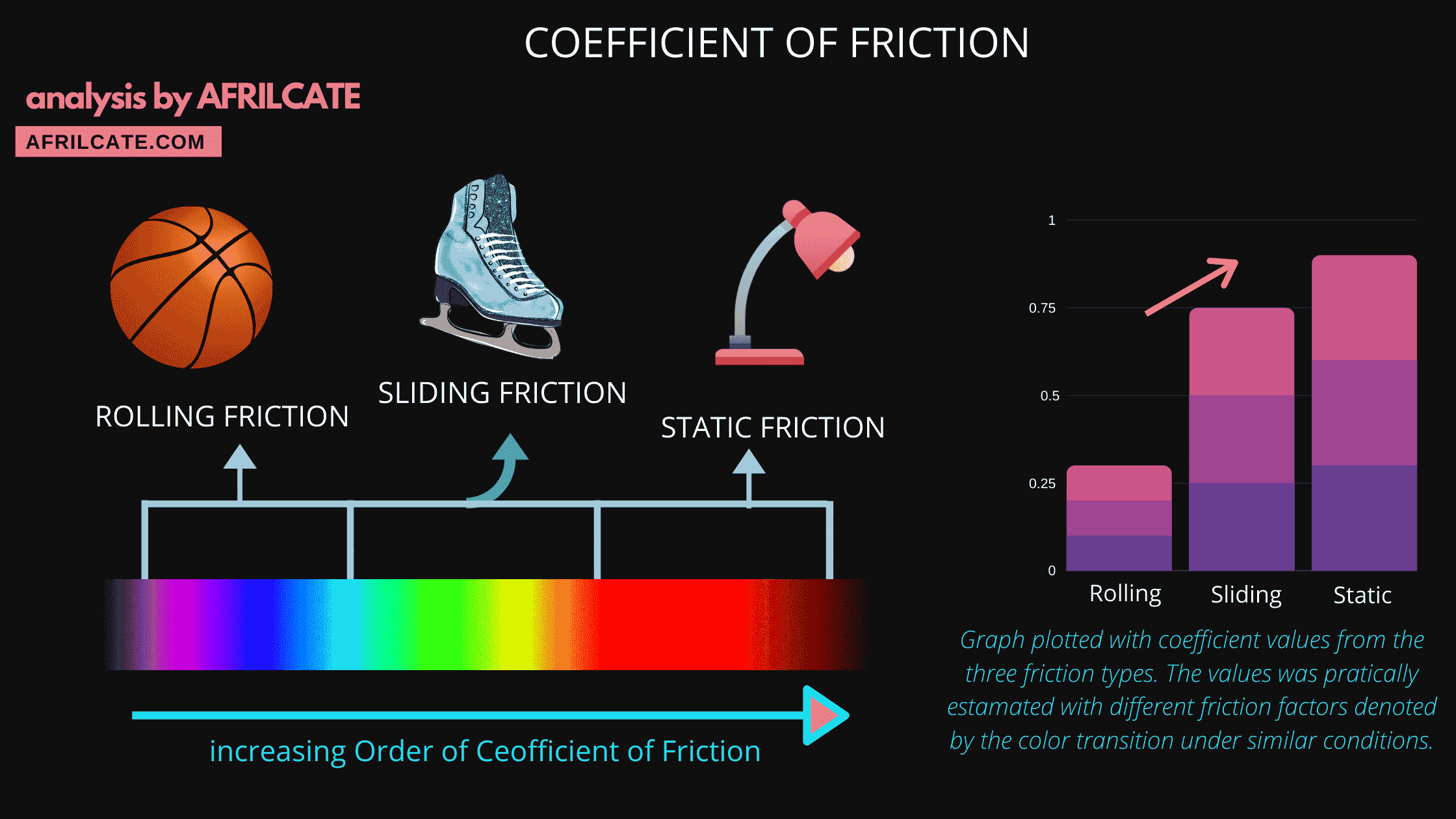Coefficient of Static Friction (Fully Explained)
written by Stanley Udegbunam ||updated Oct 20, 2020
Overview
What is Coefficient of static friction?
The coefficient of static friction is a numerical value that quantifies the degree of stickiness between a static object and its contact surface.
It is the ratio of the Static friction between two contact surfaces to the normal force acting on the body.
Recall that there are three types of dry friction: Static friction, kinetic friction and rolling friction.
The coefficient of static friction is typically higher than the coefficient of kinetic friction and the rolling friction coefficient.
This is because static friction is higher than kinetic friction and rolling friction.
This implies that more force will be required to initiate motion if an object is stationary.
Since kinetic friction is higher than rolling friction, the Coefficient of rolling friction usually have the least friction coefficient.

Formula for Coefficient of static friction
Static friction coefficient is denoted with µs.
The formula for the coefficient of static friction is given by;
| µs = Fs/N |
Where,
- Fs is the force of static friction
- N is the normal force, sometimes it’s denoted by η
The Normal force has the same magnitude as the weight.
It’s represented by the equation; N = m x g
If the object or plane is inclined at an angle (∅), the normal force becomes:
N = m gcos∅
Where m = mass of the object.
And g = acceleration due to gravity.
F and N are measured in units of force (such as Newton or pound).
Since friction is a force, the unit of the frictional force is the newton (N).
The coefficient of static friction is unitless.
How to find the Coefficient of static friction
To find the coefficient of static friction, we will use the formula above to carry out some friction coefficient calculations.
Calculations on Coefficient of static friction
Example 1
The force acting on a table-top microwave is 220N.
If the value of the static frictional force is 506N, determine the static friction coefficient.
Fs = µs N
µs = Fs/N
µs = 506/220 = 2.3
Example 2

A 50N force acts on a kerosene lamp as shown in the diagram. If the static friction is 15N, calculate the coefficient of static friction.
Solution
µs = Fs/N
Static friction = 15N
Normal force, N = 50 N
Coefficient of friction, µs = 15/50 = 0.3
µs = 0.3

TEST YOUR KNOWLEDGE
The force acting on a standing electric fan is 220N.
If the value of the static frictional force 125N, determine the static friction coefficient.
a.) 0.32
X wrong!!
b.) 1.11 x 105
X wrong!!
c.) 0.57
✔ Correct
d.) none of the above
X wrong!!
SHOW SOLVING
The correct option is c. 0.57
µs = Fs/N
µs = 125/220 = 0.57
Comprehensive List of Static friction Coefficients
The list below is a long list of static friction coefficients of different materials measured under different surface conditions.
The greasy surface condition represents any form of lubrication.
C.O.S-F —- Coefficient of Static Friction
Scroll sideways to view the complete list
Material 1 | Material 2 | Coefficient of Static Friction | |
DRY | GREASY | ||
Aluminum | Aluminum | 1.05-1.35 | 0.3 |
Aluminum | Mild Steel | 0.61 | - |
Brake Material | Cast Iron | 0.4 | - |
Brake Material | Cast Iron (Wet) | 0.2 | - |
Brick | Wood | 0.6 | - |
Bronze | Steel | - | 0.16 |
Cadmium | Cadmium | 0.5 | 0.05 |
Cast Iron | Cast Iron | 1.1 | - |
Chromium | Chromium | 0.41 | 0.34 |
Copper | Cast Iron | 1.05 | - |
Copper | Copper | 1.0 | 0.08 |
Copper | Mild Steel | 0.53 | - |
Copper | Steel (304 stainless) | 0.23 | - |
Copper-Lead Alloy | Steel | 0.22 | - |
Diamond | Diamond | 0.1 | 0.05-0.1 |
Diamond | Metal | 0.1 -0.15 | 0.1 |
Glass | Glass | 0.9 - 1.0 | 0.1-0.6 |
Glass | Metal | 0.5 - 0.7 | 0.2-0.3 |
Glass | Nickel | 0.78 | - |
Graphite | Graphite | 0.1 | 0.1 |
Graphite | Steel | 0.1 | 0.1 |
Graphite (In vacuum) | Graphite (In vacuum) | 0.5 - 0.8 | - |
Hard Carbon | Hard Carbon | 0.16 | 0.12-0.14 |
Hard Carbon | Steel | 0.14 | 0.11-0.14 |
Iron | Iron | 1.0 | 0.15-0.2 |
Leather | Wood | 0.3 - 0.4 | - |
Leather | Metal(Clean) | 0.6 | 0.2 |
Leather | Metal(Wet) | 0.4 | - |
Leather | Oak (Parallel grain) | 0.61 | - |
Magnesium | Magnesium | 0.6 | 0.08 |
Nickel | Nickel | 0.7-1.1 | 0.28 |
Nylon | Nylon | 0.15 - 0.25 | - |
Oak | Oak (parallel grain) | 0.62 | - |
Oak | Oak (cross grain) | 0.54 | - |
Platinum | Platinum | 1.2 | 0.8 |
Plexiglas | Plexiglas | 0.8 | 0..4-0.5 |
Plexiglas | Steel | 0.4 - 0.5 | 0.5 |
Polystyrene | Polystyrene | 0.5 | 0.3-0.35 |
Polystyrene | Steel | 0.3-0.35 | 0.2 |
Rubber | Rubber | 1.16 | - |
Saphire | Saphire | 0.2 | 0.2 |
Silver | Silver | 1.4 | 0.55 |
Sintered Bronze | Steel | - | 0.13 |
Solids | Rubber | 1.0 - 4.0 | - |
Steel | Aluminium Bros | 0.45 | - |
Steel | Brass | 0.35 | 0.19 |
Steel(Mild) | Brass | 0.51 | - |
Steel (Mild) | Cast Iron | - | 0.183 |
Steel | Cast Iron | 0.4 | - |
Steel | Copper Lead Alloy | 0.22 | 0.145 |
Steel (Hard) | Graphite | 0.21 | - |
Steel | Graphite | 0.1 | - |
Steel (Mild) | Lead | 0.95 | 0.3 |
Steel (Mild) | Phos. Bros | - | 0.173 |
Steel | Phos Bros | 0.35 | - |
Steel(Hard) | Polythened | 0.2 | - |
Steel(Hard) | Polystyrene | 0.3-0.35 | - |
Steel (Mild) | Steel (Mild) | 0.74 | 0.09-0.19 |
Steel(Hard) | Steel (Hard) | 0.78 | 0.029-0.12 |
Steel | Zinc (Plated on steel) | 0.5 | - |
Teflon | Steel | 0.04 | 0.04 |
Teflon | Teflon | 0.04 | 0.04 |
Titanium Alloy Ti-6Al-4V(Grade 5) | Aluminium Alloy 6061-T6 | 0.41 | - |
Titanium Alloy Ti-6Al-4V(Grade 5) | Titanium Alloy Ti-6Al-4V(Grade 5) | 0.36 | - |
Titanium Alloy Ti-6Al-4V(Grade 5) | Bronze | 0.36 | - |
Tungsten Carbide | Tungsten Carbide | 0.2-0.25 | 0.12 |
Tungsten Carbide | Steel | 0.4 - 0.6 | 0.08-0.2 |
Tungsten Carbide | Copper | 0.35 | - |
Tungsten Carbide | Iron | 0.8 | - |
Wood | Wood(clean) | 0.25 - 0.5 | - |
Wood | Wood (Wet) | 0.2 | - |
Wood | Metals(Clean) | 0.2-0.6 | - |
Wood | Metals (Wet) | 0.2 | - |
Wood | Brick | 0.6 | - |
Wood | Concrete | 0.62 | - |
Zinc | Zinc | 0.6 | 0.04 |
Zinc | Cast Iron | 0.85 | - |
MATERIAL 1 | MATERIAL 2 | C.O.S.F (Dry) | C.O.S.F (Greasy) |
Aluminum | Aluminum | 1.05-1.35 | 0.3 |
Aluminum | Mild Steel | 0.61 | - |
Brake Material | Cast Iron | 0.4 | - |
Brake Material | Cast Iron (Wet) | 0.2 | - |
Brick | Wood | 0.6 | - |
Bronze | Steel | - | 0.16 |
Cadmium | Cadmium | 0.5 | 0.05 |
Cast Iron | Cast Iron | 1.1 | - |
Chromium | Chromium | 0.41 | 0.34 |
Copper | Cast Iron | 1.05 | - |
Copper | Copper | 1.0 | 0.08 |
Copper | Mild Steel | 0.53 | - |
Copper | Steel (304 stainless) | 0.23 | - |
Copper-Lead Alloy | Steel | 0.22 | - |
Diamond | Diamond | 0.1 | 0.05-0.1 |
Diamond | Metal | 0.1 -0.15 | 0.1 |
Glass | Glass | 0.9 - 1.0 | 0.1-0.6 |
Glass | Metal | 0.5 - 0.7 | 0.2-0.3 |
Glass | Nickel | 0.78 | - |
Graphite | Graphite | 0.1 | 0.1 |
Graphite | Steel | 0.1 | 0.1 |
Graphite (In vacuum) | Graphite (In vacuum) | 0.5 - 0.8 | - |
Hard Carbon | Hard Carbon | 0.16 | 0.12-0.14 |
Hard Carbon | Steel | 0.14 | 0.11-0.14 |
Iron | Iron | 1.0 | 0.15-0.2 |
Leather | Wood | 0.3 - 0.4 | - |
Leather | Metal(Clean) | 0.6 | 0.2 |
Leather | Metal(Wet) | 0.4 | - |
Leather | Oak (Parallel grain) | 0.61 | - |
Magnesium | Magnesium | 0.6 | 0.08 |
Nickel | Nickel | 0.7-1.1 | 0.28 |
Nylon | Nylon | 0.15 - 0.25 | - |
Oak | Oak (parallel grain) | 0.62 | - |
Oak | Oak (cross grain) | 0.54 | - |
Platinum | Platinum | 1.2 | 0.8 |
Plexiglas | Plexiglas | 0.8 | 0..4-0.5 |
Plexiglas | Steel | 0.4 - 0.5 | 0.5 |
Polystyrene | Polystyrene | 0.5 | 0.3-0.35 |
Polystyrene | Steel | 0.3-0.35 | 0.2 |
Rubber | Rubber | 1.16 | - |
Saphire | Saphire | 0.2 | 0.2 |
Silver | Silver | 1.4 | 0.55 |
Sintered Bronze | Steel | - | 0.13 |
Solids | Rubber | 1.0 - 4.0 | - |
Steel | Aluminium Bros | 0.45 | - |
Steel | Brass | 0.35 | 0.19 |
Steel(Mild) | Brass | 0.51 | - |
Steel (Mild) | Cast Iron | - | 0.183 |
Steel | Cast Iron | 0.4 | - |
Steel | Copper Lead Alloy | 0.22 | 0.145 |
Steel (Hard) | Graphite | 0.21 | - |
Steel | Graphite | 0.1 | - |
Steel (Mild) | Lead | 0.95 | 0.3 |
Steel (Mild) | Phos. Bros | - | 0.173 |
Steel | Phos Bros | 0.35 | - |
Steel(Hard) | Polythened | 0.2 | - |
Steel(Hard) | Polystyrene | 0.3-0.35 | - |
Steel (Mild) | Steel (Mild) | 0.74 | 0.09-0.19 |
Steel(Hard) | Steel (Hard) | 0.78 | 0.029-0.12 |
Steel | Zinc (Plated on steel) | 0.5 | - |
Teflon | Steel | 0.04 | 0.04 |
Teflon | Teflon | 0.04 | 0.04 |
Titanium Alloy Ti-6Al-4V(Grade 5) | Aluminium Alloy 6061-T6 | 0.41 | - |
Titanium Alloy Ti-6Al-4V(Grade 5) | Titanium Alloy Ti-6Al-4V(Grade 5) | 0.36 | - |
Titanium Alloy Ti-6Al-4V(Grade 5) | Bronze | 0.36 | - |
Tungsten Carbide | Tungsten Carbide | 0.2-0.25 | 0.12 |
Tungsten Carbide | Steel | 0.4 - 0.6 | 0.08-0.2 |
Tungsten Carbide | Copper | 0.35 | - |
Tungsten Carbide | Iron | 0.8 | - |
Wood | Wood(clean) | 0.25 - 0.5 | - |
Wood | Wood (Wet) | 0.2 | - |
Wood | Metals(Clean) | 0.2-0.6 | - |
Wood | Metals (Wet) | 0.2 | - |
Wood | Brick | 0.6 | - |
Wood | Concrete | 0.62 | - |
Zinc | Zinc | 0.6 | 0.04 |
Zinc | Cast Iron | 0.85 | - |
table extracted from internet archive
Frequently Asked Questions on Static Friction Coefficient
1. What’s the coefficient of static friction of mild steel on mild steel for dry surfaces?
Ans: 0.74 (refer to the table above)
2. What’s the coefficient of static friction of wood on wood?
Ans: 0.25 – 0.5 (refer to the table)
3. What is the coefficient of friction between hard rubber?
Ans: 1.16 (refer to the table)
4. What is the coefficient of static friction between road and tires?
Ans: The coefficient of friction between road and tires largely depends on the threaded nature of the tire and the road surface condition.
For slick/racing tires, the friction coefficient can attain a very high value of 0.9 for a dry-smooth surface but can fall so low as 0.1 if the surface is wet.
For threaded/commercial tires, the coefficient of friction is about 0.7 for dry surfaces and 0.4 for wet surfaces
Now…Over to you
What do you think about this article?
was it helpful in any way and would you like to see more content like this?
Share your thoughts and answers with us in the comment section below.


This is a great tip particularly to those new to the blogosphere. Simple but very precise information… Thanks for sharing this one. A must read post!